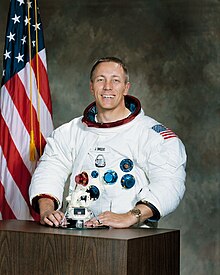Our website is made possible by displaying online advertisements to our visitors.
Please consider supporting us by disabling your ad blocker.
Jack Swigert
Jack Swigert | |
|---|---|
 Swigert in 1971 | |
| Member-elect of the U.S. House of Representatives from Colorado's 6th district | |
| Died before taking office | |
| Preceded by | Constituency established |
| Succeeded by | Daniel Schaefer (as member) |
| Personal details | |
| Born | John Leonard Swigert Jr. August 30, 1931 Denver, Colorado, U.S. |
| Died | December 27, 1982 (aged 51) Washington, D.C., U.S. |
| Resting place | Mount Olivet Cemetery |
| Political party | Republican |
| Education | University of Colorado, Boulder (BS) Rensselaer Polytechnic Institute (MS) University of Hartford (MBA) |
| Awards | Presidential Medal of Freedom NASA Distinguished Service Medal |
| Military service | |
| Allegiance | |
| Branch/service | |
| Years of service | 1953–1956 (active) 1956–1965 (reserve) |
| Rank | Captain |
| Unit | Massachusetts Air National Guard (1957–1960) Connecticut Air National Guard (1960–1965) |
| Space career | |
| NASA astronaut | |
Time in space | 5d 22h 54m |
| Selection | NASA Group 5 (1966) |
| Missions | Apollo 13 |
Mission insignia | |
| Retirement | August 1977 |
John Leonard Swigert Jr. (August 30, 1931 – December 27, 1982) was an American NASA astronaut, test pilot, mechanical engineer, aerospace engineer, United States Air Force pilot, and politician. In April 1970, as command module pilot of Apollo 13, he became one of 24 astronauts who flew to the Moon.[1][2] Ironically, due to the "slingshot" route around the Moon they chose to safely return to Earth, the Apollo 13 astronauts flew farther away from Earth than any other astronauts before or since, though they had to abort the Moon landing.
Before joining NASA in 1966, Swigert was a civilian test pilot and fighter pilot in the Air National Guard. After leaving NASA, he ran for Senate but lost in a primary election against Bill Armstrong. Later he ran for Congress, but while running was diagnosed with cancer. He won the election for Colorado's new 6th district in 1982, but died before being sworn in.
- ^ Eicher, Diane (December 19, 1982). "Ex-astronaut's challenge". Beaver County Times. p. B2 – via Google News.
- ^ Treaster, Joseph B. (December 29, 1982). "Jack Swigert, astronaut elected to Congress, dies". The New York Times. Retrieved June 30, 2018.
Previous Page Next Page


